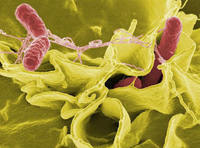What is dysentery? How to diagnose and treatment of dysentery? Answers to these questions you will find in the article.
Content
Dieseneria, symptoms of dysentery

Dysentery -
Infectious intestinal disease. Meets around the world
in people of all ages, but special distribution gets in hot
season.
sick man. Dysentery infection occurs when not compared
Personal hygiene rules. Dieseneria is a disease of dirty hands . However,
You can get sick, and using infected water or products, soaked such
water and insufficiently processed thermally.
Incubation period of the disease - from several hours to 2-3 days.
Pathogen
Disease causes inflammation of the walls of the large intestine. Main
symptom of dysentery - not very abundant, private liquid stool with mucus,
Movement, blood, dark green and false urges for defecation, so
called tenesm. In addition, the patient
The overall well-being is disturbed, nausea appears, vomiting, decreases
appetite, worried headaches. During the development of the disease, it is possible
Dehydration development.
Diagnostics and treatment of dysentery
Dysentery diagnosis
is put by a infectious disease physician symptoms. Additionally
Assign studies to clarify the pathogen and apply
Antibiotics of the narrow spectrum of action - Cala.
Treatment
Dysentery is carried out in the hospital. In the treatment of dysentery, the doctor decides
Two tasks - the fight against the microbe-causative agent (apply
Antibiotics) and fluid loss compensation - abundant drink
and intravenous infusion of special solutions.
With good
organism resistance disease is completely cured for 7-10 days,
But sometimes it can acquire and wave character (more often it happens
For those people who have not fully held a course appointed by the doctor
treatment that threatens the occurrence of chronic form of the disease).
IN
The course of the disease must be carefully monitored
Complications Dehydration and intestinal armor (intestinal break).
The latter is evidenced by the appearance of blood in feces. Split
requires immediate surgery.
Immunity from persistent unstable, repeated cases of infection are possible.









